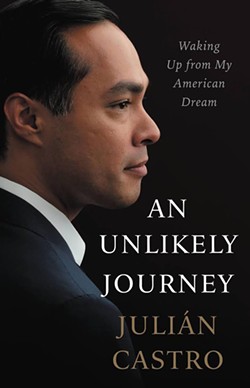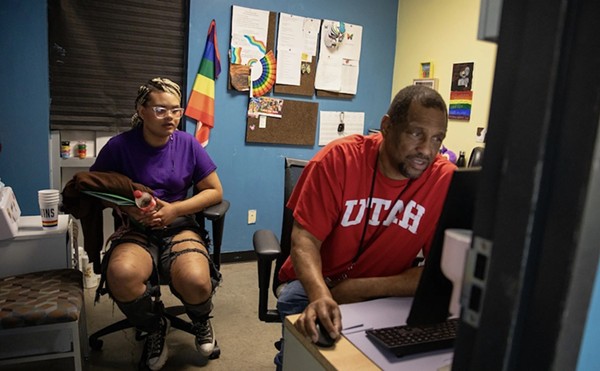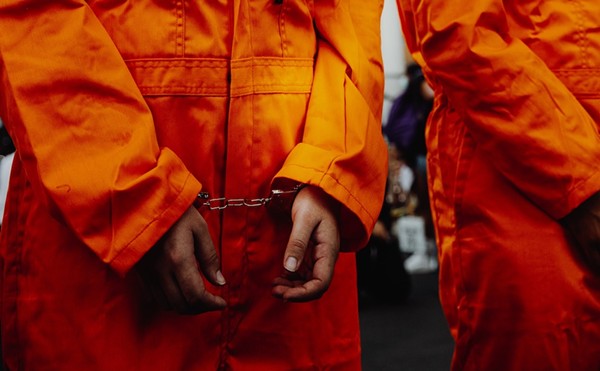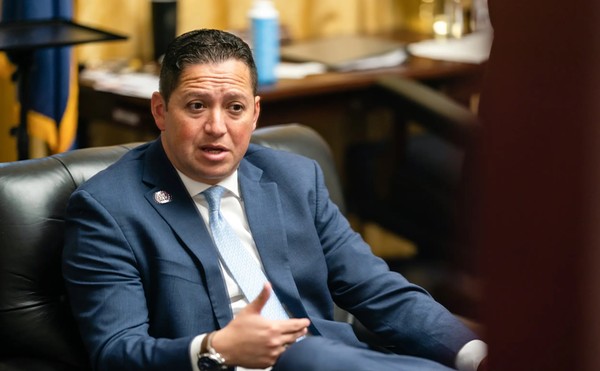Off to the side were those of us who’d watched his methodical, grassroots campaign for District 7 council seat in 2001, his leadership in fighting the PGA Village, his bitter loss to Phil Hardberger in 2005 and his political resurrection four years later. By 2011, we knew his and twin brother Joaquin’s life story so well it might as well have been tattooed on our forearms.
Still, we measured the visiting reporters’ work against what we already knew.
Did you know Mamo, Castro’s grandmother, crossed the border at Eagle Pass with her sister in 1922? And that Mamo, an orphan, was denied a formal education and grew up to clean houses across San Antonio?
Yes, I’d first heard that a couple of elections ago. Powerful stuff. That’s how the family stories of many San Antonians start.
Did you know his mother, Rosie Castro, was a hellraising leader of the Committee for Barrio Betterment who had the guts to challenge the Good Government League as part of a Chicano slate for city council in 1971?
Yup. Her activism, including her organizing muscle, is key to understanding her sons’ politics and the acumen that made them household names here.
She raised the twins as a single mother.
I know.
Driven by Rosie to succeed academically, they graduated from Jefferson High School a year early and earned spots at Stanford and then Harvard Law.
Uh huh.
Castro decided to run in District 7 when he was still in law school.
I KNOW.
So I’ll admit to being a little wary when I picked up an advance copy of Castro’s memoir, An Unlikely Journey, which is out October 16. Castro has always been a cautious and calculating politician, sensitive to how he’s perceived. And more than anything else, this slender book – it’s all of 225 pages, maybe because he’s all of 44 years old – is his vehicle for defining himself and his story for a national audience ahead of the 2020 presidential election. In other words, I expected no new revelations about growing up on the West Side or his climb in San Antonio or national politics.
I was wrong… ish.
The familiar outline of Castro’s life is there as well as the altar-boy-cum-meritocrat notes he likes to strike, often with a sledgehammer. But he adds texture to the story many San Antonians are already familiar with.
He writes about his Mamo, for example, as a woman stunted in some ways because she was pulled from school in the third grade – though she taught herself to read and write in Spanish and English – and lived in a household so strict she couldn’t date until she was 32. Finally allowed out, she began seeing an 18-year-old and became pregnant in almost no time. The boy took off, and she eventually delivered Rosie.
“[She] was a constant in our lives, always making us delicious meals and telling us Mexican fairy tales about misbehaving kids being eaten. She also drank 40-ounce beers, escorted my brother and me to see Friday the 13th when we were 10, had a child out of wedlock with a man almost half her age, suffered from depression and diabetes, made the best
Castro’s mother also takes on more human dimensions than we’ve seen before.
Smart and strong-willed, she strained against her Catholic school education and the suffocating discipline of her mother’s family, which clouded the adult Rosie’s relationship with her mom. She sometimes had to tag along – they traveled everywhere by bus – when Mamo cleaned houses on the North Side, witnessing her bad treatment by some employers. Others were condescending. At one job, Rosie was sent out back to remove ticks from the family cocker spaniel; she responded by throwing rocks at cars parked on the street.
Here’s what Castro wrote about the incident: “As a young girl, Mom’s frustration at the difference between her world and the one inhabited by the employers was understandable. The rock throwing, though, was something different. The people who owned the house Mamo was cleaning, and those who owned the cars, likely were not bad people, but to my mom, as a little girl, the contrast couldn’t have been more stark. I hope she had
The passage says as much about the son as it does the mother. Castro’s evenhandedness would’ve been hard to justify if Latinos hadn’t wielded at least a little more political and economic power in the San Antonio he and Joaquin grew up in than in their mother’s day. That they were better off stems partly from the work of Rosie and her generation of activists. It’s also the observation of a seasoned politician who’s had to campaign for the housecleaner’s vote and the employer’s vote, and who’s had to make compromises to win them both.
An Unlikely Journey fills in some of the gaps in what we know about Rosie’s relentless organizing and her struggle to earn her master’s degree and keep her family above the poverty line; her relationship with Jesse Guzman, a public-school teacher and married father of five with whom she conceived the twins; and her determination to give her sons the free-wheeling intellectual environment, with lots of questioning and arguments, that she would have loved as a kid. She was a nurturing mother, and also fallible. Castro didn’t gloss over her bouts of heavy drinking, which ended after Guzman moved out and the family moved to a new
The Castros – including Mamo, who lived with Rosie and the boys – reflected the challenges that a lot of working-class families face, from the pressure to pay the bills and put food on the table to
But Julián and Joaquin, a congressman, neither drink nor smoke. They like structure and aren’t prone to edgy identity politics or class warfare. They meticulously cultivate reporters and editors to influence how they’re covered in the media; they want to be seen as immaculately clean – in their ethics and their motivations – as one of Julián’s white dress shirts. While it may seem paradoxical, their M.O. largely comes down to their mother and her laser-focus on their education and the discipline they would need to thrive in SAISD and two of the country’s most elite schools.
Ever wonder where Pre-K for SA, the city’s sales tax-funded program for preschoolers and Castro’s biggest achievement as mayor, came from? Look no further than Rosie.
The instinct that brought the news herd to San Antonio early in Castro’s run as mayor – that this guy would soon break into the national spotlight – was right on. Obama literally gave him a national stage when he blessed Castro with the keynote speaker’s slot at the 2012 Democratic National Convention. Nearly two years later, Obama appointed him to head up the Department of Housing and Urban Development, giving him the Washington experience he would need if called on to serve as, say, the Democrats’ vice presidential candidate. (Hillary Clinton put Castro on the list in 2016 but didn’t call on him.)
Now he’s traveling regularly to early presidential-primary states and dropping not-so-subtle hints about running for president in 2020. It’s in that light that An Unlikely Journey will, and should be, read – as an early campaign document – though when he started writing the book, Castro probably didn’t see himself in the near future as anything grander than Clinton’s 2016 running mate.
The second half of the book takes readers through his years at Stanford and Harvard Law and his fast climb in local and national politics. Disappointingly, this stretch skimps on new details and insights. Castro is more interested in establishing his personal narrative with voters than shedding light on how he wielded power and moved public opinion to accomplish what he did in San Antonio and to position himself for national politics.
With less to hold readers’ interest, one begins to pay more attention to Castro’s habit of writing about his life as though it’s played out in a series of neat lessons. Every couple of pages, he stops the action to spell out what he learned from whatever action he’s just described. There’s a moral to just about every story.
The book also offers up a couple of unintended ironies, including Castro’s embrace of the nonpartisanship of city elections when he first ran for the District 7 council seat in 2001. “When I showed up at someone’s doorstep, that voter could consider my candidacy without the bias that party affiliation brings,” wrote the politician who did more than any other San Antonio mayor to plunge the office into party politics. Remember, for example, that DNC speech and how it went over with local Republicans?
But despite its shortcomings, An Unlikely Journey is worth reading for what it says about Castro’s and his brother’s early development and, more importantly for local readers, San Antonio’s transition to a more politically open and diverse city.
Stay on top of San Antonio news and views. Sign up for our Weekly Headlines Newsletter.






















